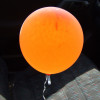Question
Marian wrote in to ask "I've noticed that when I scratch an itch, the itch seems to move around my body. I was wondering why this is."
Answer
Otis Kingsman interviewed Dr Yvonne Couch from the Radcliffe Department of Medicine to find the answer...
Yvonne - Humans have about 22 feet of skin, and for each square inch of it there are about 1000 nerve endings. When these free nerve endings become active, they send signals through your spinal cord to your brain, giving you the feeling of an itch.
Otis - Scratching an itch it an attempt to remove what is causing these nevres to become active from the surface of the skin. But what kinds of processes can activate these nerve endings?
Yvonne - If you have any kind of neurological disease, or you’re being treated with a drug like morphine, you can end up with itches that start in your elbow and end up in your feet as caused by multiple different nerve endings becoming active.
Otis - Internal stimulants can mean itches occur in multiple places at once. But what about the more common itches?
伊冯,当我们得到一些东西像一只蚊子e, or some degree of local tissue damage, Histamine is released in the skin. It’s an inflammatory molecule, designed to open up your blood vessels and bring more blood to the injured site to fight off infection. But in the process, the blood vessels brush past and stimulate the free nerve endings, leading you to itch it.
Otis - In the process of combating our injury, the blood vessels inadvertently make our brain think we’re in more distress. But why does scratching become addictive?
Yvonne - Itch signals have been shown to stimulate bits of your brain associated with reward so you end up almost addicted to scratching because it produces more itch, which produces more scratching and more itching!
Otis - This pleasure sense from the brain is what keeps us scratching. And the more we scratch, the more damage we cause to the skin.
Yvonne - The signal gets to your brain and a bunch of central processing tells you to scratch the itch. Scratching around the area of the itch though, causes local irritation in the surrounding skin, which releases more histamine and activates more of those free nerve endings, sending you into what the scientists imaginatively call ‘the itch-scratch cycle’.
Otis - When you scratch an itch, you are telling the brain to release more Histamine to make the surrounding blood vessels expand and stimulate the nearby nerve endings. Because your brain likes it when these endings are scratched, it leads to the itchy area expanding and expanding until your whole body feels itchy.
Yvonne - When your mum told you to not scratch because you’ll only make it worse, she was right!




Comments
Add a comment